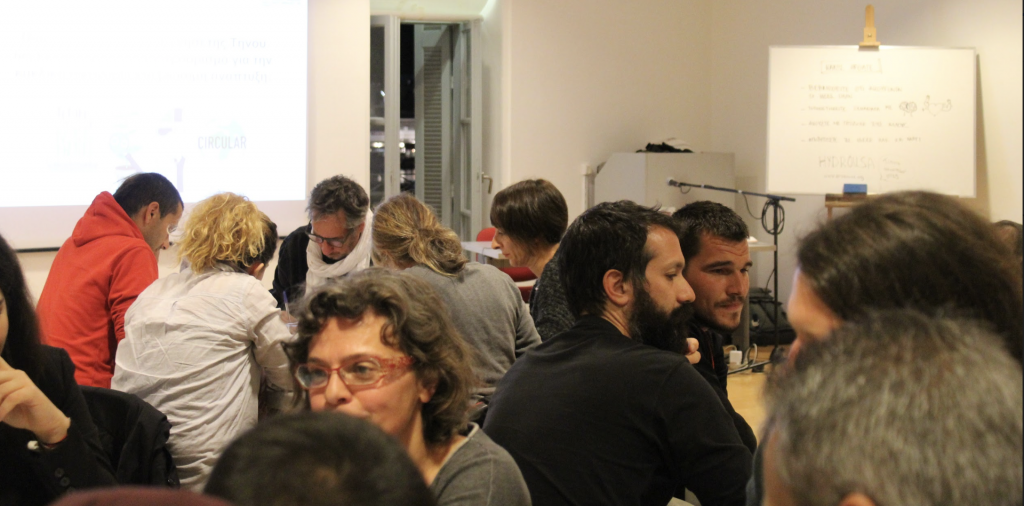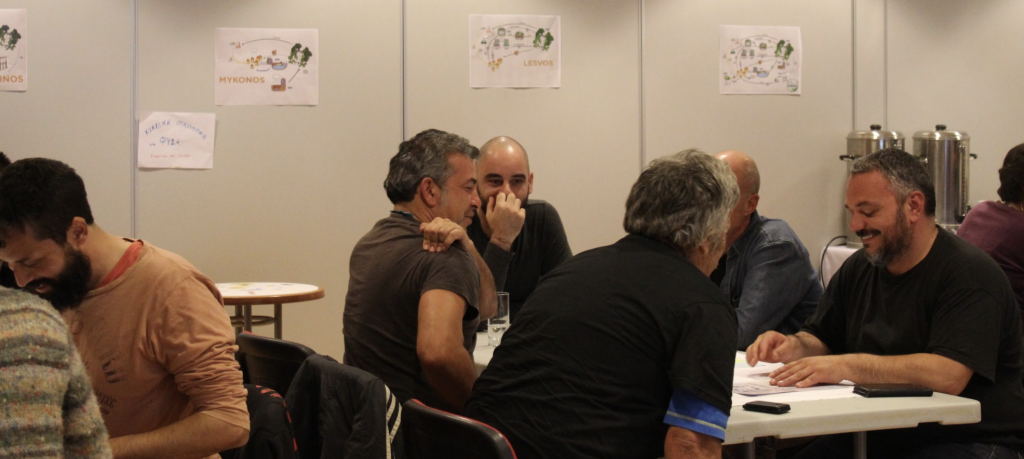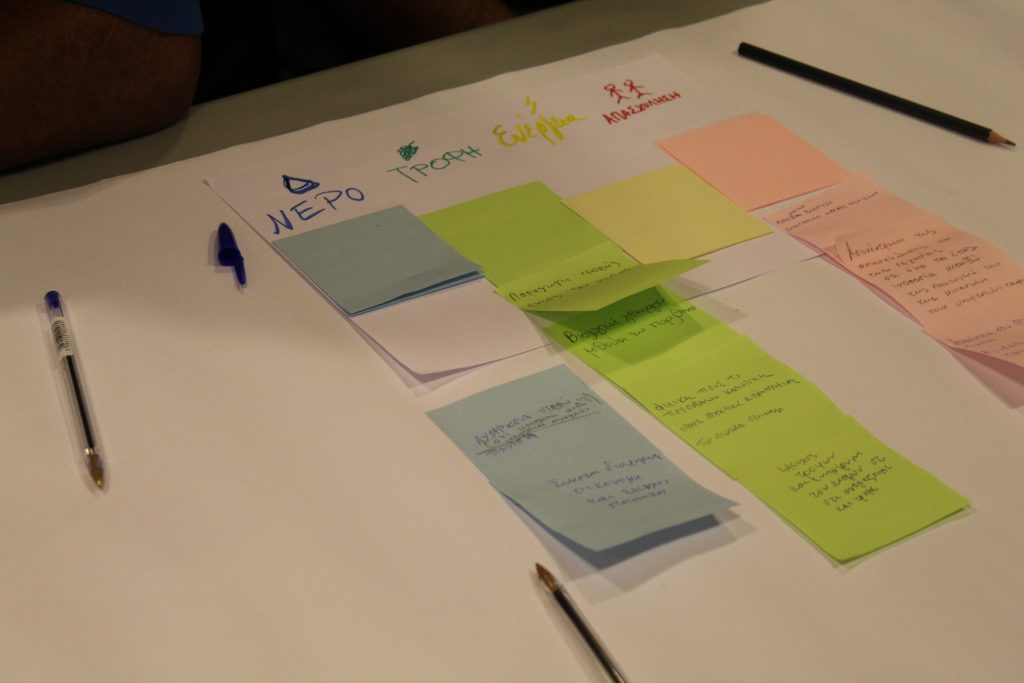“Tinos as a paradigm of sustainable development & circular economy
through the gaze of the island’s local community/locals”.

HYDROUSA team arrived to Tinos to meet local partners and the island’s stakeholders for a co-creation workshop. Impact Hub Athens members teamed up with alchemia-nova representatives and invited interested individuals with local knowledge to re-imagine Tinos as a paradigm of sustainable development showcasing smart applications incorporating values of circular economy.
HYDROUSA designs and implements two pilot applications on the island, an alternative desalination system based on biomimicry design at Ag.Fokas, in collaboration with the Municipality of Tinos and a self-sufficient eco-tourist unit which operations are fully circular, in collaboration with Tinos Ecolodge.
On the 22nd of November a co-creation workshop took place at Cultural Foundation of Tinos, aiming to introduce the applications to the island’s mindful individuals and to further capitalize on their local knowledge.
Farmers, agriculturists, representatives of local authority, restaurant owners, construction workers, artists, teachers & academics teamed up to co-design the future of Tinos.
 The workshop was implemented according to the methodology of World Cafe by encouraging the participants to work in five teams, to think with heart & mind, to express freely, to fuse ideas & concepts and to interact in a friendly space.
The workshop was implemented according to the methodology of World Cafe by encouraging the participants to work in five teams, to think with heart & mind, to express freely, to fuse ideas & concepts and to interact in a friendly space.
The process was successful as all the participants ended up with interesting ideas & solutions, revolving around the basic questions: How are we visioning Tinos as a paradigm of sustainable development? Which are the best practices, already evident on the island? What’s missing? Which is the contribution of each & every one based on profession/profile towards sustainable & circular economy practices?
Groups were invited to select a category between energy, water, food & employment and to explore sustainable concepts around it taking in mind the social, environmental & economic impact in parallel with the island’s unique characteristics.
Regarding the employment sector, basic findings included the promotion of the traditional architecture and the local gastronomy in order to attract slow tourism, which goes hand in hand with the showcase & preservation of existing sustainable practices (composting & recycling) in order to create more job opportunities while at the same time safeguarding the place’s heritage.
Driving focus onto the value of tangible heritage encourages the demand for local constructors & experts and allows the transfer of local know-how to younger generations.
Similarly, the promotion of local products and cultivation processes may advance local production and economy. These activities can adhere to the principles of circular economy (e.g use of manure of pigeon houses as fertilizer)by showcasing implications of alternative methods for sustainable development and appealing to the interested audience.
The second group who engaged with the specific category (employement) drew focus on the need of space or a format where specific ideas could be backed up, enhanced & implemented as sustainable initiatives while also create new entrepreneurial opportunities relating to the promotion of the island’s natural beauty & heritage.
Examples such as Tinosfoodpaths constantly promoting the island’s unique traits & customs, agricultural cooperatives, Tinos Ecolodge & more represent the special identity of the island based on sustainable practices.
The expansion of the employment spectrum and a way of certification of the unique local products were presented as gears of employment enhancement & place identity upgrade.
The “Water” group mentioned as an important factor the need for law modification so as to protect & regulate the existence of a private cistern.
Additional solutions were spotted in the need for funding on sustainable applications for the collection & preservation of water in historic buildings or hotels and on the confinement of private water usage from public networks.
Other interesting ideas for closing the water circles included the exploitation of wastewater for private watering as well as small-scale dams for water collection on decentralized level.
Working on the domain of “Food”, the participants sensed that more and more young individuals are engaging in activities of the primary sector and bring in new knowledge and innovative cultivation processes. Positive existing initiatives include increased production of local wine, new records for small-scale vineyards, development of apiculture and flexible regulation for small-scale cheese dairies.
Other opportunities for implementing the values of circular economy and sustainable development is the creation & enhancement of small local communities and cooperatives of decentralized areas. Collaboration between local producers & restaurant owners aligned with quality standards in production & consumption of food and limitation of monoculture.
Α first step towards sustainable food consumption is to produce and consume locally, including the local community and the visitors of the island. This practice could be injected in the strategic marketing of the destination [Wanna Taste Tinos local artichoke? Drop off for a visit!]
On a second level, the creation of an island network for the production and exchange of local products appeared as a sustainable practice.
On the subject of Energy, participants attempted to conceptualize saving practices and enhancement of self-sufficiency through local energy production in accordance to circular economy solutions.
By describing the current situation, the group mentioned energy waste, lack of information on the implications of aimless consumption and the issues that might be caused.
On the positive side, the favourable weather of the island allows the usage of solar energy while the breezy climate and the traditional housing designs encourage wise energy consumption reinforced by potential technical applications.
Moreover, through the activity of the academic community and the research programmes focusing on the island, access to knowledge and development of innovative solutions on a pilot level (eg HYDROUSA) is encouraged.
With regards to the legal framework, the regulation of energy communities, creates opportunities for energy production and fosters the involvement of the local community.
Currently, a new initiative is being born among stakeholders of the island and initiates discussions and actions in the domain of energy production.
The social cooperative enterprise Kalloni-Kelia is already active on the island on matters relevant to waste management and it could play a crucial role by facilitating activities for sustainable energy production.

Areas of improvement were found in the encouragement of “sustainable” investments, the necessary education & information from people in key roles on the island but also the understanding concerning the actual return (not only economic) resulting from decentralized energy production solutions.
The participants reached consensus on the need for education through the involvement of schools, the interaction with the academic community and the continuous information and fermentations as important prerequisites for sustainable development in the future.
In the end of the worksop, participants were invited to fill in questionnaires, created specifically for HYDROUSA by Agenso, pertaining to the technical standards of the applications currently being developed and the importance of water usage on domestic and communal level and the agricultural production.
They were encouraged to write down, their potential immediate contribution to the place’s sustainability.







